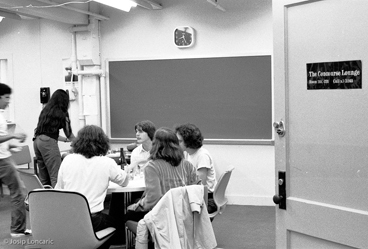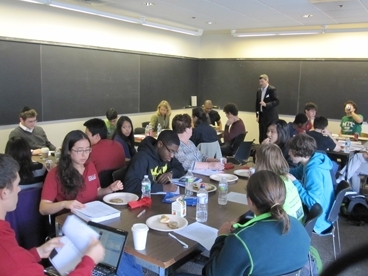This year marks the 40th anniversary of Concourse at MIT, a program founded to be a learning community for freshmen and their instructors to explore the interconnections between disciplines as disparate as literature and physics, history and mathematics.
Professor Louis Bucciarelli and Professor David Oliver initiated the project that became Concourse in 1970. It was in spring 1971 that Concourse received formal academic and budgetary approval, along with permission to begin enrolling students that fall. As Concourse begins to celebrate its 40th anniversary, the program is returning to a more explicit engagement with its interdisciplinary roots.
This resourcement has been an overarching goal for Professor Bernhardt Trout since becoming program director in July 2009. Trout hopes to reinvigorate the program while continuing to attract students who wish to understand the full human, ethical and philosophical context of their technical studies.
In the face of Institute-wide budget cuts, Professor Trout has refreshed the humanities component of the Concourse curriculum with a two-semester philosophy sequence. The fall course, Becoming Human: Ancient Greek Perspectives on the Best Life, focuses on the origins of political and ethical philosophy beginning with the question of what makes the best human life. In the spring, Modern Conceptions of Freedom addresses the philosophical foundations of modern politics, especially liberal democracy as manifest in the American system of government.
As a freshman program, Concourse includes the science and math General Institute Requirements. The Concourse Integration Seminar bridges the humanities and the sciences by exploring questions about the origins of science and the distinct human choices that have produced modern scientific institutions. The aim is to give students the lay of the intellectual-historical landscape so that they can become better leaders, that is, people who can not only solve problems, but also identify which problems most need solutions.
Meanwhile, the program has also seen some personnel changes. In January, administrator Cheryl Butters retired after 35 years at the heart of the program. For many people around the Institute, she had come to symbolize Concourse. Many program alumni as well as Professor Bob Rose, a former program director, returned to pay their respects and reminisce at her retirement party in December.
Butters spent the month of January before her official retirement day training her replacement, Paula Cogliano. “She’s left some big shoes to fill,” says Cogliano, “and I’m excited to fill them.” In addition to taking over Butters’ duties, Cogliano will be helping to plan the festivities as Concourse this year celebrates its 40th anniversary.
Professor Louis Bucciarelli and Professor David Oliver initiated the project that became Concourse in 1970. It was in spring 1971 that Concourse received formal academic and budgetary approval, along with permission to begin enrolling students that fall. As Concourse begins to celebrate its 40th anniversary, the program is returning to a more explicit engagement with its interdisciplinary roots.
This resourcement has been an overarching goal for Professor Bernhardt Trout since becoming program director in July 2009. Trout hopes to reinvigorate the program while continuing to attract students who wish to understand the full human, ethical and philosophical context of their technical studies.
In the face of Institute-wide budget cuts, Professor Trout has refreshed the humanities component of the Concourse curriculum with a two-semester philosophy sequence. The fall course, Becoming Human: Ancient Greek Perspectives on the Best Life, focuses on the origins of political and ethical philosophy beginning with the question of what makes the best human life. In the spring, Modern Conceptions of Freedom addresses the philosophical foundations of modern politics, especially liberal democracy as manifest in the American system of government.
As a freshman program, Concourse includes the science and math General Institute Requirements. The Concourse Integration Seminar bridges the humanities and the sciences by exploring questions about the origins of science and the distinct human choices that have produced modern scientific institutions. The aim is to give students the lay of the intellectual-historical landscape so that they can become better leaders, that is, people who can not only solve problems, but also identify which problems most need solutions.
Meanwhile, the program has also seen some personnel changes. In January, administrator Cheryl Butters retired after 35 years at the heart of the program. For many people around the Institute, she had come to symbolize Concourse. Many program alumni as well as Professor Bob Rose, a former program director, returned to pay their respects and reminisce at her retirement party in December.
Butters spent the month of January before her official retirement day training her replacement, Paula Cogliano. “She’s left some big shoes to fill,” says Cogliano, “and I’m excited to fill them.” In addition to taking over Butters’ duties, Cogliano will be helping to plan the festivities as Concourse this year celebrates its 40th anniversary.







